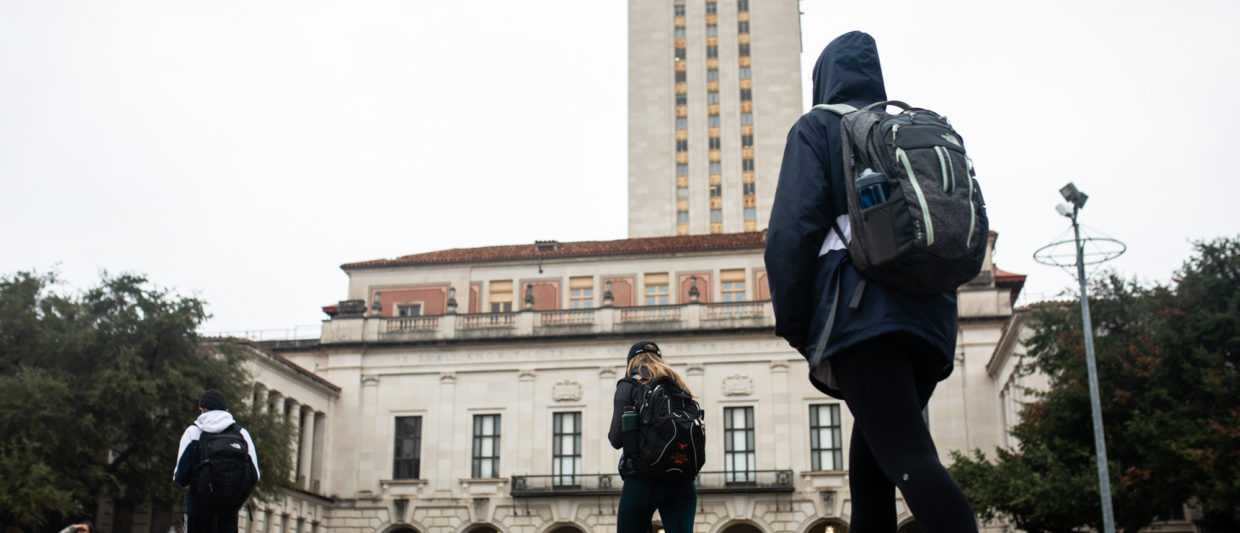UT Bans TikTok Due to Security Concerns, But Some Professors Wary
By Jinpeng Li
Reporting Texas

UT students walk to class along the Main Mall in front of the bell tower on Oct. 17, 2018. Salvador Castro/Reporting Texas.
When University of Texas at Austin Journalism Professor Samuel Woolley read an email Monday from the university administration saying that the use of the social media app TikTok would not be allowed on university Wi-Fi networks, he wasn’t surprised, but he was disappointed.
“Blocked TikTok on all Wi-Fi networks means that I’m not able to actually do my research on Tiktok,” Woolley said.
UT is one of several public universities to ban TikTok during the last six weeks, joining Auburn University, Boise State University, Texas A&M University, the University of Florida and others.
In addition to universities banning TikTok, 19 governors around the nation, including Texas Gov. Greg Abbott, have cited concerns about the Chinese government surveilling users as their reason for banning the app, which is owned by the China-based company Bytedance.
“The university is taking these important steps to eliminate risks to information contained in the university’s network and to our critical infrastructure,” Jeff Neyland, UT’s adviser to the president for technology strategy, wrote in a letter to staff about the ban. In a press release detailing the Texas state ban, Abbott cited “the threat of the Chinese Communist Party to infiltrate the United States.”
In a series of interviews, some UT professors such as Woolley said they understand the concern over TikTok but voiced anxiety about the ban affecting their ability to do research and teach.
Woolley runs a propaganda research lab on campus which focuses on studying how social media is used to manipulate public opinion. TikTok is one of the primary platforms he studies.
TikTok is a place where influencers can amplify politically partisan messages, and the situation can be exploited by bad actors, Woolley said. In a 2020 paper, Woolley’s team concluded that political influencers on apps such as TikTok threaten “the security and integrity of elections in the United States and beyond.”
To understand the threat, Woolley said, “we need to spend time understanding TikTok and using TikTok.”
TikTok is extremely popular among college-age students. Almost, two-thirds of teenagers in the U.S. use TikTok, according to a 2022 Pew Research Center study.
Adam Klein, a senior lecturer at UT Law Schools’s Strauss Center for International Security and Law said the app can be manipulated to influence public opinion. For example, the algorithm could be tweaked to promote popular videos critical of American foreign policy. Klein said the app could potentially also funnel Americans’ personal data to the Chinese government.
“TikTok functions as a sophisticated surveillance tool that harvests extensive amounts of personal and sensitive data,” Klein said in testimony submitted to the Texas Senate Judiciary Committee in September, and in China, “the law requires companies to assist the government with national-security matters.”
“These scenarios may seem far-fetched, but it is only prudent to plan around what is technically possible given the design and market penetration of the app,” Klein added.
Klein said he does hope that UT President Jay Hartzell makes exceptions for legitimate academic use of Tiktok.
Michael Mosser is a UT government professor and co-director of the Global Disinformation Lab. Mosser said UT essentially had to ban TikTok after Abbott’s executive order in December.
“We are classified as a state agency. All UT employees, even faculty, are state employees as well. So that’s why UT had to comply,” Mosser said.
The university has been put in a position where it has to choose between “free expression, the ability to use any platform you want for content creation and consumption … and national/state security,” Mosser added.
Gina Masullo, a UT journalism professor who teaches a class on social media, said TikTok is a favorite among students.
Masullo siad TikTok has been used in her class minimally. “We have a short video production assignment, where students did use TikTok to complete it,” she said.
Masullo is now instructing students not to use TikTok and has removed all references to TikTok from class materials.
“There are still plenty of ways for students to tell stories using video, like Instagram reels, Facebook live. This won’t have a large effect on the class,” Masullo said
For his part, Woolley is also recalibrating his classes to avoid use of the app. “TikTok became a crucial tool for teaching. We might talk about TikTok. They might cite TikTok in their papers,” Wooley said. “Now, no.”